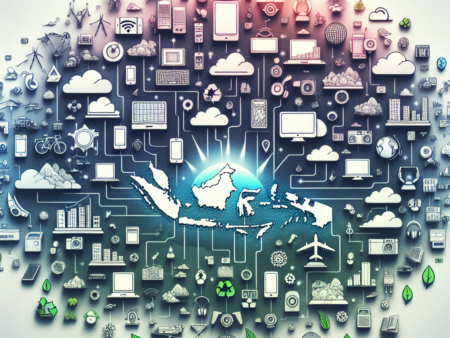Deskripsi meta: Transformasi digital UMKM: Membangun bisnis kreatif di era modern untuk pertumbuhan dan kesuksesan yang berkelanjutan.
Transformasi Digital UMKM: Membangun Bisnis Kreatif di Era Modern
-
Table of Contents
- Introduction
- The Importance of Digital Transformation for UMKM
- 1. Enhancing Market Reach
- 2. Improving Operational Efficiency
- 3. Enabling Data-Driven Decision Making
- Strategies for Digital Transformation
- 1. Establishing an Online Presence
- 2. Embracing E-commerce
- 3. Adopting Cloud Computing
- 4. Investing in Digital Marketing
- Challenges and Solutions
- 1. Limited Digital Skills
- 2. Connectivity and Infrastructure
- 3. Cybersecurity Concerns
- Summary
Introduction
Digital transformation has become a buzzword in recent years, and for good reason. The rapid advancement of technology has revolutionized the way businesses operate, and small and medium-sized enterprises (UMKM) in Indonesia are no exception. In this article, we will explore the concept of digital transformation for UMKM and how it can help build creative businesses in the modern era.
The Importance of Digital Transformation for UMKM
1. Enhancing Market Reach
One of the key benefits of digital transformation for UMKM is the ability to enhance market reach. In the past, UMKM were limited to selling their products or services within their local communities. However, with the advent of e-commerce platforms and social media, UMKM can now reach a much wider audience. By establishing an online presence, UMKM can tap into the vast potential of the digital market and expand their customer base beyond geographical boundaries.
2. Improving Operational Efficiency
Digital transformation also offers UMKM the opportunity to improve their operational efficiency. By adopting digital tools and technologies, UMKM can streamline their business processes, automate repetitive tasks, and reduce manual errors. For example, inventory management systems can help UMKM keep track of their stock levels in real-time, minimizing the risk of overstocking or stockouts. This not only saves time but also reduces costs and improves overall productivity.
3. Enabling Data-Driven Decision Making
Data is a valuable asset in the digital age, and UMKM can leverage it to make informed business decisions. Through digital transformation, UMKM can collect and analyze data on customer preferences, buying patterns, and market trends. This data-driven approach allows UMKM to tailor their products or services to meet customer demands, identify new market opportunities, and stay ahead of the competition. By understanding their customers better, UMKM can create personalized experiences that drive customer loyalty and satisfaction.
Strategies for Digital Transformation
1. Establishing an Online Presence
The first step towards digital transformation for UMKM is to establish an online presence. This can be done through creating a website or setting up social media accounts. A well-designed website can serve as a virtual storefront, showcasing products or services and providing essential information to potential customers. Social media platforms, on the other hand, offer a cost-effective way to engage with customers, build brand awareness, and drive traffic to the UMKM’s online platforms.
2. Embracing E-commerce
E-commerce platforms have revolutionized the way businesses sell their products or services. UMKM can leverage these platforms to reach a wider audience and tap into the growing trend of online shopping. By listing their products on popular e-commerce platforms, UMKM can benefit from the platform’s existing customer base and marketing capabilities. Additionally, e-commerce platforms often provide tools for inventory management, order fulfillment, and payment processing, making it easier for UMKM to manage their online sales.
3. Adopting Cloud Computing
Cloud computing offers UMKM the flexibility and scalability they need to thrive in the digital era. By migrating their operations to the cloud, UMKM can access their data and applications from anywhere, at any time. This eliminates the need for expensive on-premises infrastructure and allows UMKM to focus on their core business activities. Cloud computing also provides UMKM with the ability to scale their resources up or down based on demand, ensuring they have the necessary computing power and storage capacity without incurring unnecessary costs.
4. Investing in Digital Marketing
Digital marketing plays a crucial role in the success of UMKM’s digital transformation journey. By investing in digital marketing strategies such as search engine optimization (SEO), social media marketing, and content marketing, UMKM can increase their online visibility and attract more potential customers. Digital marketing also allows UMKM to target specific customer segments, track the effectiveness of their marketing campaigns, and make data-driven adjustments to optimize their marketing efforts.
Challenges and Solutions
1. Limited Digital Skills
One of the main challenges UMKM face in their digital transformation journey is the limited digital skills among their workforce. Many UMKM owners and employees may not have the necessary knowledge or expertise to leverage digital tools effectively. To overcome this challenge, UMKM can invest in training programs or workshops to upskill their workforce. They can also consider hiring digital-savvy employees or partnering with digital agencies to assist them in their digital transformation efforts.
2. Connectivity and Infrastructure
Connectivity and infrastructure issues can hinder UMKM’s digital transformation progress, especially in remote or rural areas of Indonesia. Limited internet access and unreliable network connections can pose significant challenges for UMKM trying to establish an online presence or conduct online transactions. To address this issue, the government and private sector need to work together to improve internet infrastructure and expand internet coverage to underserved areas. UMKM can also explore alternative solutions such as mobile data plans or satellite internet to overcome connectivity challenges.
3. Cybersecurity Concerns
As UMKM embrace digital technologies, they also become more vulnerable to cybersecurity threats. Cyberattacks can result in data breaches, financial losses, and damage to the UMKM’s reputation. To mitigate cybersecurity risks, UMKM should prioritize cybersecurity measures such as implementing strong passwords, regularly updating software and applications, and educating their employees about cybersecurity best practices. UMKM can also consider partnering with cybersecurity firms to ensure the security of their digital infrastructure.
Summary
Digital transformation presents immense opportunities for UMKM in Indonesia to build creative businesses in the modern era. By enhancing market reach, improving operational efficiency, and enabling data-driven decision making, UMKM can thrive in the digital economy. Strategies such as establishing an online presence, embracing e-commerce, adopting cloud computing, and investing in digital marketing can help UMKM embark on their digital transformation journey. However, challenges such as limited digital skills, connectivity and infrastructure issues, and cybersecurity concerns need to be addressed to ensure a successful transformation. With the right strategies and support, UMKM can leverage digital technologies to unlock their full potential and contribute to Indonesia’s economic growth.







